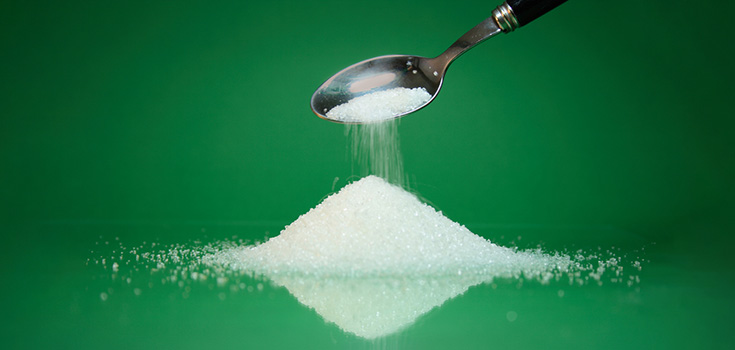Scientists Declare Health Crisis Over Carcinogenic Sugars

Many people know that sugar is far over-consumed and is contributing to nearly every health condition we face. But do people really know the full extent to which this is happening? The United States is facing a wide-spread sugar epidemic and it truly is having a negative impact on health. It seems that many consumers have a health-afflicting sweet tooth, and that has everything to do with how normal sugar consumption really is. That is to say, once you stop consuming so much sugar, you won’t even want or feel like you need it anymore.
Fighting the War Against Sugar
A team of UCSF scientists think that sugar is so toxic and so addictive that it should be regulated with taxes, restricted on to whom and where it can be advertised, and age-restricted sales. Right they are in their view on sugar and how it is highly addictive and toxic. Fructose has even been shown to be addictive as cocaine while fueling cancer and obesity rates. But would regulating sugar really be the answer to the problem?
While sugar consumption definitely needs to be lessened, creating laws against is not the answer. The government doesn’t need to create laws for every single issue we face. Certainly companies shouldn’t be allowed to blatantly lie and tout foods as being healthy when they contain 25g of sugar per serving, but that is another issue.
A viable solution would simply be to educate from youth on what truly is and isn’t healthy.
In a paper published in the journal Nature today, the UCSF scientists argue that the increase in global consumption of sugar is the primary reason for the escalation of many chronic diseases. But the scientists don’t think that simple education and awareness will work as a solution. Dr. Robert Lustig, a pediatric endocrinologist at UCSF states:
“The only method for dealing with this is a public health intervention…Everyone talks about personal responsibility, and that won’t work here, as it won’t for any addictive substance. These are things that have to be done at a governmental level, and government has to get off its ass.”
He makes an interesting point – to let the same government body who claimed walnuts to be illegal drugs take care of the problem. It may indeed be difficult to fix the problem through education and awareness alone, but that is only because of how the advertising system is currently operating. In western society, the subconscious mind of the individual is often subject to a number of heavy influences — through entertainment mediums especially. Television, movies, and music create a profound subconscious effect on the human mind that influences and dictates the choices that they will make to at least some degree.
These food advertisements are influencing children even more than parents. One study had parents read a script which directed their child either to avoid or eat the junk food. To monitor the results, the children were then offered coupons for both apple slices and french fries. Among the children who viewed the commercial for the fast food fries, 71% chose the coupon for the fast food fries over the apple splices if their parents did not intervene. If the children were encouraged to choose the healthy food by their parents, that number only dropped to 55%.
So accompanied with education and awareness must be a transformation in advertising. Children can not be bombarded with ads for “healthy” cereals that contain ridiculous amounts of sugar. Sugar is so rampant in cereals that the Environmental Working Group has created a list of the 10 worst children’s cereals. All of the cereals are 40-50 percent sugar by weight – and this is only one example.
The food and beverage industries, however, seem to think that sugar is perfectly OK. Undoubtedly influenced by government lobbying, The American Beverage Association states:
“There is no evidence that focusing solely on reducing sugar intake would have any meaningful public health impact.”
This sounds very similar to what doctors said back in the 50’s about cigarettes having no negative health impacts. Sugar has been playing a huge role in the rising rates of heart disease, obesity, diabetes, and much more for some time. Too much sugar alters your biochemistry and makes you more vulnerable to metabolic conditions that lead to illness and disease. Of course the industries want you to consume their sugar-riddled drinks — addictive sugar is a goldmine.
On average, Americans consume 475 calories worth of added sugars each day. That is about 30 teaspoons, or 5x more than even the American Heart Association recommends. The recommended amount of sugar to consume on a daily basis is only 25g, but look at what we have to currently battle:
- An average bottle of Coke contains over 60g of sugar.
- A Red Bull contains up to 27g of sugar.
- Supposedly healthy Vitamin Water contains up to 13g of sugar.
- An 8oz Snapple contains up to 23g of sugar.
- A single Pop Tart contains 17g of sugar.
- A Cinnabon Cinnamon Roll has up to 55g.
- Most kids cereals, like Capn Crunch, Frosted Flakes and Trix contain anywhere from 10-12g of sugar per serving.
- A 16oz Starbucks Mocha Grande Frappuccino contains over 40g of sugar.

"A viable solution would simply be to educate from youth on what truly is and isn’t healthy." I agree with this. If we would be informed and educated of what is really healthy and not, then we can perform right actions and avoid those those misconceptions.